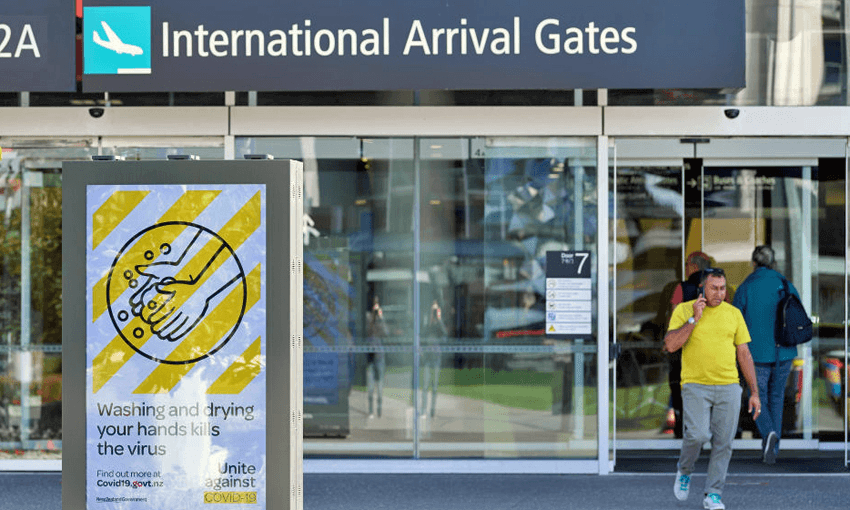As CEO of her iwi rūnanga, Debbie Ngarewa-Packer was on the frontline protecting her community during the first outbreak of Covid-19. Now that more virulent strains threaten to breach our borders, the Māori Party co-leader calls on the government to introduce much stricter measures.
As we enter the New Year I think it’s important that we take stock of where we are at as a nation in the context of the global Covid-19 pandemic.
It has become increasingly clear to me that Aotearoa is currently at greater risk than we’ve ever been of another significant outbreak of the virus. We are dealing with the impacts of increasing international arrivals, the virus mutating into new strains, and a rollout of vaccines that may be too slow to prevent another lockdown.
Now is the time for discipline and vigilance, not for getting complacent and returning to business as usual.
Throughout the pandemic, I have taken the position of advocating for tough measures, and as much precaution as possible, to ensure the virus doesn’t spread in our communities.
As a leader of an at-risk rural iwi with few services, early last year I had to quickly mobilise with my whanaunga iwi to ensure we had the systems and support in place to keep the virus out of our community. We lobbied locally, regionally and nationally for resources, established a call hub, sent out kai and sanitation packs, and we set up iwi community checkpoints to discourage inter-regional travel.
Our top priority was protecting our whakapapa – and that’s what needs to continue to guide us. To achieve that we need to act to try and prevent another significant outbreak before it happens. That’s why I am calling on the government to:
- Put a weekly cap on international arrivals of 1,000 people per week
- Implement policy to test all arrivals pre- and post-arrival in Aotearoa
- Bring planned vaccinations forward to the first quarter of 2021
- Release a full vaccination schedule
It’s evident that the virus is now mutating into strains that are much more infectious, and that are crippling countries across the world in a manner harsher than the first strain. It’s critical to have stricter pre-testing to cross our borders, as we contain the new strain in MIQ facilities.
The breaches that we’ve had in MIQ have come about when we had too many people to manage. Under these circumstances, mistakes become inevitable. With MBIE statistics showing an average 2,600 people coming across our borders weekly, it is important that we again challenge ourselves to reduce entries. Queensland, which has the same population as us, has put in a cap of 1,000 people per week – halved until containment of the new strains.
Researcher Dr Rawiri Taonui has worked tirelessly over the past year tracking and analysing global Covid-19 data, and interpreting it to forecast outcomes for Māori communities here in Aotearoa. His latest report, commissioned by the Iwi Leaders Forum and released this week, says 5,553 people are pre-booked to enter over the next two weeks (Queensland’s arrivals will be 18% of that), and with more than 50 countries in the world experiencing this new strain, our government needs to immediately implement the new policy to test everyone before entering our country and test all arrivals again once they are in Aotearoa, to ensure our protection.
Aotearoa must also be prepared to actually close our borders, particularly from hotspot countries with reported high cases of the new strains, such as the UK.
I have come to the view that we need to the follow the example of Australia, the European Union, Canada, Mexico and Chile and bring forward the vaccine schedule to start earlier than planned.
The Ministry of Health’s public information suggests that vaccinations for the first batch of people, including high-risk groups, will not happen until the second quarter of 2021, which will mean we won’t start to build up our resistance to the virus until at least June or July. Grant Robertson has in recent days suggested that there may even be further delays to this.
I am calling on the government to do everything they can to bring this forward, and to start offering vaccinations to MIQ staff and high-risk groups as soon as possible. They need to be fully transparent and release the vaccination schedule.
We know that other countries are requiring large quantities of vaccines, but we’ve had months to pre-order vaccines and so we can’t let this stop us from preventing a further outbreak. If this is going to require significant more investment in procuring and testing vaccines, then that is what must happen.
There have also been reports that there may be issues with rolling out vaccines across the country and into rural communities. From my experience in South Taranaki with previous lockdowns this would come as no surprise. Additional resources and capacity are needed to ensure the infrastructure for a successful vaccination strategy is in place.
We must do everything we can to ensure we are prepared as we can be for another outbreak, and starting to build up community immunity with vaccinations is an essential part of that. It’s also crucially important that whānau continue scanning wherever we go, regularly wash our hands, and test and remain at home if unwell.
I will continue to push to ensure that the Covid-19 response meets the needs of Māori and other at-risk communities. We’re going to ask the hard questions, and challenge government decisions where necessary, while working constructively alongside them.
We can’t let complacency around managing the first wave get in the way of taking all precautions to protect our whānau and at-risk communities. If an outbreak gets out of control, we can then at least say we did everything we could to try and prevent it from happening in the first place.

